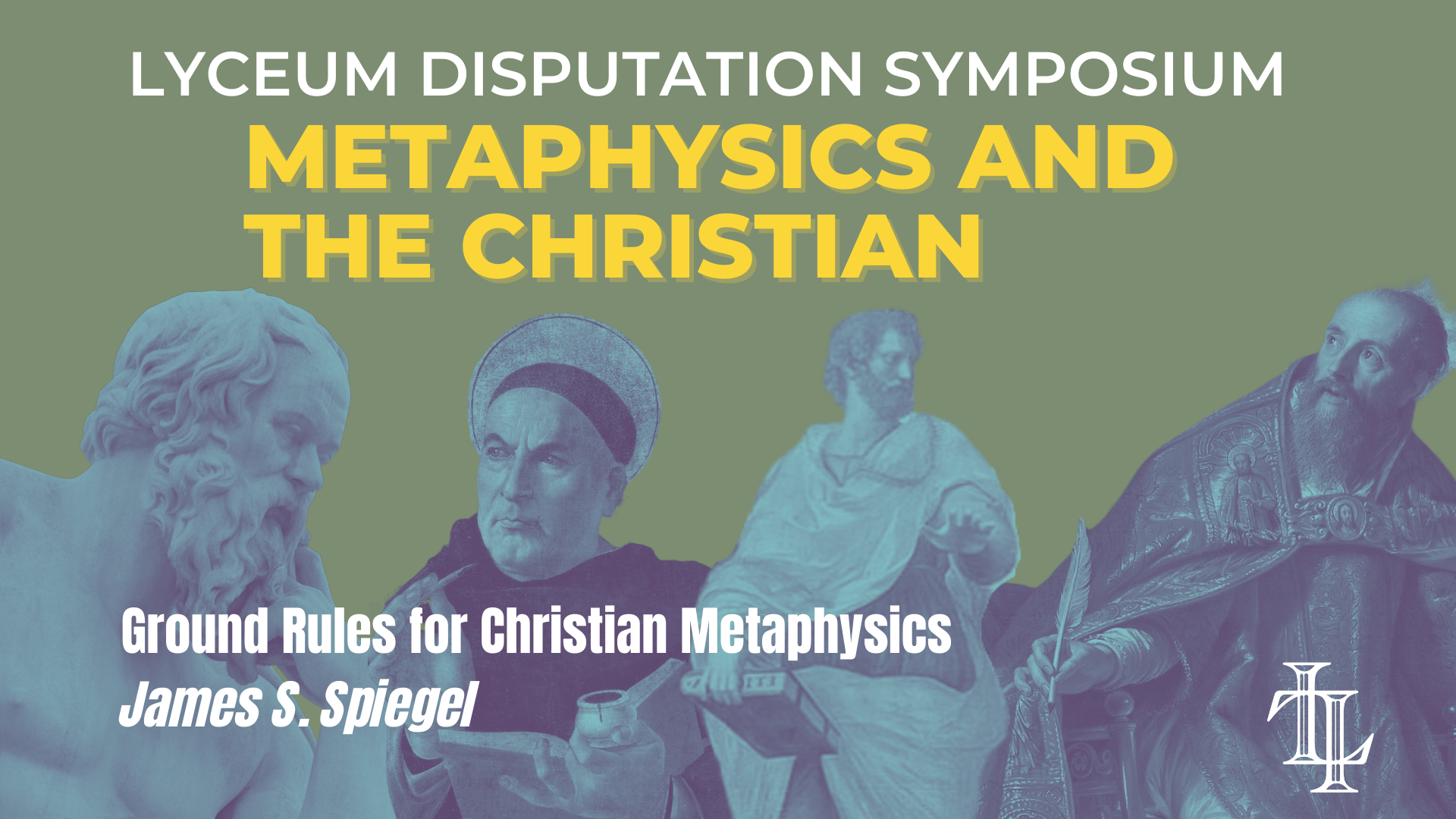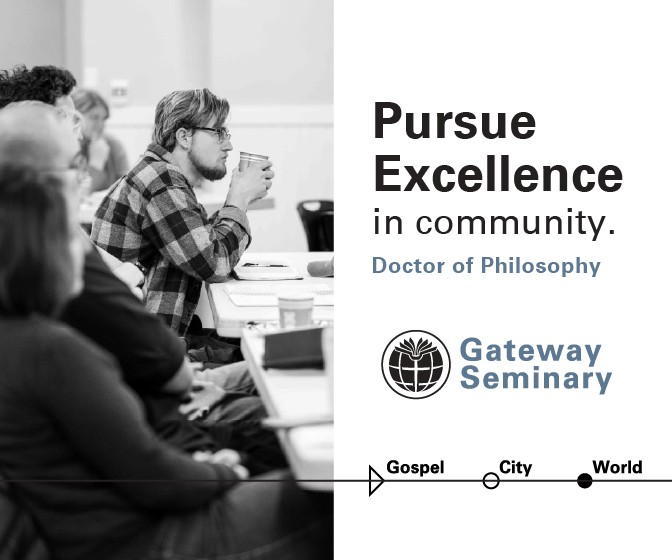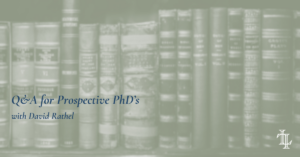Editor’s Note: This is part 1 in our Lyceum Disputation series on metaphysics and the Christian. Stay tuned for further installments which can be found here when available. As with all our work, the London Lyceum publishes a range of viewpoints to encourage thinking.
Just what is metaphysics is a subject of some debate. Aristotle understood metaphysics to concern “first causes” and “being as such.”1Aristotle, Metaphysics, I.1-2 and IV.1. However, since the time of the ancient Greeks, the list of issues which have come to be regarded as metaphysical has expanded considerably. Still, to simplify things, we can grant that metaphysics generally concerns what we might call fundamental reality. Today standard metaphysical issues pertain to, among other things, the nature of substance, properties, universals, space, time, causality, personal identity, and freedom. Thus, one might ask, “do extra-terrestrials exist?” The metaphysician asks, what does it mean to say something “exists”? What does it mean to be a substance? How are substances related to properties? Are some properties, such as “blue” or “clever,” universal in the sense that they are shared by different substances? Or are there only individual things that get described as such? What sort of thing is a human being? Do humans have souls? If so, what is the nature of a soul? What is God, and how does God relate to any of these things—substances, properties, souls? We may ask similar questions about the nature of space, time, causality, freedom, and personhood.2For a good overview, see Peter van Inwagen and Meghan Sullivan, “Metaphysics,” Stanford Encyclopedia of Philosophy (https://plato.stanford.edu/entries/metaphysics/).
Much ink has been spilled regarding these sorts of questions over the centuries. It is important to note that, like so much of philosophy, debate about these issues often pertains to definitions. That is, the discussion of these concepts often focuses on the very meaning of terms we are using—terms we deploy to address many other issues that are downstream from metaphysics, including important issues in ethics, politics, and religion.
This shows how metaphysical inquiry is both profoundly important and unavoidable. I say it is important because one’s metaphysical conclusions or assumptions often determine one’s stance on a wide range of issues. Think of the vastly divergent implications of different views of human nature (i.e., whether humans are strictly material or ensouled beings) for everything from the ethics of abortion to the possibility of life after death. In short, our metaphysical convictions—whether arrived at reasonably or not—may ultimately dictate our view of the meaning of life. And I say that metaphysics is unavoidable mainly in the sense that if one hopes to have reasonable positions on many practical moral and religious questions, one must do metaphysics first. Of course, we may elect to avoid carefully engaging such issues, but that will not change the fact that our metaphysical assumptions nonetheless drive our positions on these other issues.3For some helpful general introductions to the topic, see William Hasker, Metaphysics: Constructing a Worldview (Downers Grove, IL: InterVarsity Press, 1983); J. P. Moreland and William Lane Craig, Philosophical Foundations for a Christian Worldview, part III (Downers Grove, IL: InterVarsity Press, 2017); and Alyssa Ney, Metaphysics: An Introduction (New York: Routledge, 2014).
While there is not a detailed metaphysical system specified in Scripture that all Christians must embrace, the Bible certainly does speak to metaphysical issues, including the ultimate nature of God (He is a singular being, eternally existing in three persons), the cosmos (created, sustained, and teleologically directed by God), and the reality of a spiritual realm that transcends our (largely) observable physical domain. As to other metaphysical issues, such as those mentioned above, concerning substance, properties, universals, space, time, causality, personal identity, and freedom, Scripture does not speak with technical specificity. However, there is much biblical content that is relevant, even directly so, to each of these issues. In light of this, and the above noted importance and unavoidability of metaphysics, we should ask what it means to do metaphysics Christianly. In what follows I address this question in terms of both philosophical responsibility and theological faithfulness.
General Theoretic Guidelines
How should the Christian take proper care when engaging in metaphysical inquiry and theorizing?4To be clear, my aim here is not to defend a particular Christian or biblical metaphysic so much as to propose theoretical parameters within which the Christian metaphysician may safely operate. For those interested in defenses of particular metaphysical positions, I recommend Four Views on Christian Metaphysics, edited by Tim Mosteller (Eugene, OR: Cascade, 2022). Let’s consider what we might call “ground rules” that should guide the Christian metaphysician. I will divide these into two categories: general theoretic guidelines and theologically concerned guidelines. The most basic general theoretic guideline for doing metaphysics is logical consistency. This is the simple requirement that any metaphysical doctrine—like any other theoretical construct—must avoid self-contradictory claims or implications. Thus, the claims that propositions have no truth value is logically inconsistent because it is self-referentially absurd. And a self-proclaimed hard determinist who maintains that racists are immoral would be logically inconsistent as well. After all, if hard determinism is true then humans are not morally responsible for anything they do, including the performing of hardcore racist actions. The requirement of logical consistency transcends scholarly disciplines, applying to every domain of human inquiry, including metaphysics.
Furthermore, one’s overall metaphysical perspective should be internally coherent, in the sense that the various claims within the system “fit” well with one another. Just as in Christian theology the doctrines of sin, hypostatic union, atonement, and divine grace fit together naturally and even mutually explain one another, so must one’s metaphysical accounts of substance, personal identity, freedom, etc. fit well together. So, for example, while a physicalist view of human nature may be logically consistent, it might not fit well with the metaphysical convictions that human beings are free or have post-mortem existence. Moreover, physicalism might not fit well with certain non-metaphysical convictions one might have, such as that human beings are morally responsible and that our actions are causally influenced by our beliefs and intentions.5For an excellent treatment of many of such difficulties with physicalism, see Lynne Rudder Baker, Saving Belief: A Critique of Physicalism (Princeton: Princeton University Press, 1988). As a formal criterion of theoretical reasonableness, internal coherence also transcends the disciplines.6Views differ as to what exactly coherence is. Some prefer to understand coherence as having to do with mental attitudes as opposed to a relationship between formal propositions. See, for example, Alex Worsnip, “What is (In)coherence” in Oxford Studies in Metaethics, vol. 13, edited by Russ Shafer-Landau (Oxford: Oxford University Press, 2018), 184-206.
Thirdly, there is the guideline of explanatory scope. This concerns a theory’s capacity for explaining a broad range of facts and data within its subject domain. A given metaphysical theory might provide helpful (consistent, coherent, and empirically adequate) accounts regarding time, space, and causality but fail miserably at accounting for human freedom, personal identity, and life after death. And for some other metaphysical systems the opposite might be true. In either case, these theories suffer from the liability of limited explanatory scope. An ideal metaphysical account will enjoy explanatory power across the entire range of metaphysical issues, from cosmological issues to those which concern the nature of God, human beings, and human destiny.7For an interesting analysis of explanatory power, see Petri Ylikoski and Jaakko Kuorikoski, “Dissecting Explanatory Power,” Philosophical Studies (2010): 201-219.
Finally, there is the empirical adequacy. A standard requirement of any scientific theory is that it properly account for observable phenomena. Although metaphysics is very different from science, this standard still applies to metaphysics because metaphysical theories often have empirical implications and may be assessed accordingly. So, if one’s metaphysical view of time implies that temporal relationships are absolute, this seems problematic because it fails to account for what contemporary physics tells us about time. Or if one’s view of human nature implies that life after death is impossible, this might be challenged by empirical data drawn from NDE studies (i.e., personal accounts of near-death experiences).8For several decades, a steady stream of popular books has been published which recount personal NDEs of all kinds. Among these accounts there is a broad range of reliability, from trustworthy to downright fraudulent. In recent years, rigorous research into the phenomenon has been on the rise. Perhaps most significant among these initiatives is the NDE research project at the University of Virginia School of Medicine, led by Bruce Greyson, the Chester Carlson Professor Emeritus of Psychiatry and Neurobehavioral Sciences (https://med.virginia.edu/perceptual-studies/our-research/near-death-experiences-ndes/). Greyson was also the long-time editor of the Journal of Near-Death Studies, which is dedicated entirely to NDE research. And so it goes—it is problematic for a metaphysical theory to contradict what has been demonstrated to be the case by the “hard” sciences (e.g., physics, chemistry, biology) or other empirical studies (e.g., psychology, history, etc.).
Of course, this raises an important question: How do we know that a given well-established scientific theory won’t turn out to be false? After all, no scientific theory, even if uniformly endorsed by the scientific community, is infallible.9On this point, see my recent article “Resisted Science: Key Lessons from Old Controversies,” Salvo 62 (Fall 2022). https://salvomag.com/article/salvo62/resisted-science Accordingly, one might worry that current scientific consensus might problematically stall metaphysical inquiry. Might this concern warrant our scuttling the criterion of empirical adequacy? I don’t think so, though it does recommend a nuanced application of the guideline. For instance, we might say that a well-established scientific theory enjoys a strong presumption in its favor and for this reason a metaphysical thesis that challenges or creates tensions with current scientific orthodoxy assumes a significantly greater burden of philosophical support. A good historical example of this is the metaphysical idealism of George Berkeley, which defied aspects of the scientific orthodoxy of his time, specifically Newtonian notions of absolute space and time. Knowing this, Berkeley offered extensive philosophical argumentation in support of his thesis.10Berkeley’s principal defenses of his thesis that “to be is to be perceived or to be a perceiver,” which implies that the entire physical world is mind-dependent, are to be found in his Treatise Concerning the Principles of Human Knowledge (1710) and Three Dialogues Between Hylas and Philonous (1713). For some recent scholarly explorations of Berkeley’s thesis and its implications, see James S. Spiegel, Joshua Farris, and S. Mark Hamilton, eds., Idealism and Christian Theology (Bloomsbury Press, 2016) and James S. Spiegel and Steven B. Cowan, eds., Idealism and Christian Philosophy, (Bloomsbury Press, 2016). Nearly two centuries later there came a revolution in physics which served to confirm Berkeley’s thesis, as Einstein and other twentieth century physicists led the way in overturning key aspects of the Newtonian paradigm. This is one historical illustration as to why the standard of empirical adequacy should be seen as a general guideline, not an absolutely rigid criterion for reasonable metaphysical inquiry.
Theologically Concerned Guidelines
These general guidelines are perhaps uncontroversial. Things get a bit more tricky, however, as we consider potential theological ground rules for doing metaphysics. But I think one might reasonably contend for a criterion of doctrinal orthodoxy and a rule of overall congruency with Scripture. As for the standard of doctrinal orthodoxy, here we are concerned with whether one’s metaphysic is consistent with the central doctrines of the Christian faith. As a criterion for testing this, one might propose that any metaphysical doctrine must be consistent with the major ecumenical creeds (i.e., the Apostles’ Creed, the Nicene Creed, the Constantinopolitan Creed, the Chalcedonian Definition, and the Athanasian Creed). Such creeds represent a strong historical consensus among Christian theologians and biblical scholars and for this reason arguably embody at least a reasonable starting point for assessing not only doctrinal positions of all kinds but also metaphysical doctrines and their logical implications.11I propose the ecumenical Christian creeds as doctrinal guideposts for Christians generally. Depending on one’s theological sub-tradition, one might prefer to consult the standards of a particular confessional document to set more narrow parameters for metaphysical theorizing. For some good historical introductions to church creeds and confessions, see Jaroslav Pelikan, Credo: Historical and Theological Guide to Creeds and Confessions of Faith in the Christian Tradition (New Haven, CT: Yale University Press, 2005) and Donald Fairbairn and Ryan Reeves, The Story of Creeds and Confessions: Tracing the Development of the Christian Faith (Grand Rapids: Baker, 2019).
Now when we talk of the doctrinal fit of a metaphysical stance with Christian credal standards, this can be understood in at least two ways, one of which is more demanding than the other. We might say, on the one hand, that a metaphysical doctrine “fits” credal standards just in the broadly logical sense that it does not explicitly contradict anything that is affirmed in the Creeds. On the other hand, we might prefer to apply the “doctrinal fit” criterion in the stricter sense of being at home with the credal standards. That is to say, a metaphysical doctrine may be a more or less natural or comfortable fit with the credal standards. Depending on a variety of factors, one might be inclined to defend one or the other of these two ways of conceiving doctrinal fit, though the latter, more strict understanding naturally raises questions of application: What exactly constitutes a more (or less) “natural” or “comfortable” fit with credal standards?12In any case, one might see the standard of doctrinal fit as a particular theologically concerned application of the more general formal coherence requirement discussed above. While scholars often use such terminology, the terms themselves nearly always go undefined.
Here we might illustrate and reinforce the distinction with some examples. Some metaphysical theories that seem very much at home with the classical creeds include the doctrines of the spiritual and eternal nature of God, the mind-body dualist account of human nature, and divine transcendence of both space and time. Theories that are logically consistent with the creeds but which are not necessarily a natural fit arguably include nominalism and the tripartheid view of human nature.
As for instances of violations of the broader logical sense of doctrinal fit, any metaphysical theory that implies the impossibility of miracles or human immortality would clearly contradict some of the classical creeds. Likewise, a metaphysic that entailed a denial of the basic divine attributes, such as omniscience or omnipotence, or ruled out the possibility of an incarnate deity (a human being who also possesses the divine essence) would contradict some of the classical creeds and therefore be unacceptable. Such theories fail even a broad test of logical consistency with credal orthodoxy. Still other theories, while logically consistent with the classical creeds, nonetheless sit in tension with orthodoxy. A potential example here, is open theism, according to which God neither transcends cosmological time nor has exhaustive divine foreknowledge. Open theists generally insist that their doctrine does not rule out divine omniscience. But in order to preserve formal consistency with credal orthodoxy, they redefine omniscience as knowledge of all truths that can be known and then insist that future free human choices are simply not knowable. But given the long history of understanding divine omniscience as encompassing all future events, many argue this creates a serious tension with the open theist conception of divine limitation by time. So, while this metaphysical component of open theism may be logically consistent with the classical creeds, it does not fit comfortably within this tradition.13For some philosophical and theological critical responses to open theism, see John M. Frame, No Other God: A Response to Open Theism (Phillipsburg, NJ: P&R Books, 2001); James S. Spiegel, The Benefits of Providence: A New Look at Divine Sovereignty (Wheaton, IL: Crossway, 2005); and Bruce A. Ware, God’s Lesser Glory: The Diminished God of Open Theism (Wheaton, IL: Crossway, 2000).
While doctrinal orthodoxy is the most important biblical criterion for any metaphysical doctrine, we should also consider overall Scriptural congruency. This is the standard that requires a given metaphysic to be fully consistent with the biblical witness, even on matters which do not concern historically central theological issues. Here, too, we may distinguish between broad and strict versions of this criterion. One may require that a metaphysical theory only be broadly consistent with Scripture, or one may insist that a metaphysic must be very much at home with Scripture, all things considered.
Let’s consider some metaphysical views that seem to defy Scripture on non-credal matters. Any purely materialist theory that includes a physicalist account of human nature is arguably problematic because of its inconsistency with biblical texts that affirm a supernatural aspect of human beings. For example, the Apostle Paul says, “We are always confident and know that as long as we are at home in the body we are away from the Lord. For we live by faith, not by sight. We are confident, I say, and would prefer to be away from the body and at home with the Lord. So, we make it our goal to please him, whether we are at home in the body or away from it” (2 Cor. 5:6-9). In this passage, Paul repeatedly contrasts life “in” the body with life “away” from the body, seemingly implying that human life continues after death, independently of our earthly physical embodiment. Other biblical texts reinforce this notion of an irreducible non-physical, supernatural aspect of human nature (e.g., Mt. 10:28; James 2:26; 1 Pet. 3:18).14For an exegetical analysis of assorted biblical passages supporting a dualist perspective, see John W. Cooper, “Biblical Anthropology is Holistic and Dualistic” in The Blackwell Companion to Substance Dualism, edited by Angus J. L Menuge, Jonathan J. Loose, and J. P. Moreland (Oxford: John Wiley & Sons, 2018), 411-426.
Any metaphysical account of time that denies divine transcendence of cosmological time will be problematic from a biblical standpoint. In three different passages, the apostle Paul refers to the “beginning of time” (i.e., 1 Cor. 2:7; 1 Tim. 1:9; Titus 1:2). If God is eternal, then the fact that time had a starting point would seem to imply that God is not time-bound (though some deny this). If so, then God transcends cosmological temporality, and any metaphysic affirming otherwise is arguably biblically unacceptable. However, this doesn’t appear to rule out the possibility of a deeper “ontological” time within which God operates, though the theoretical justifiability of such a transcendent, immeasurable time might be questionable in itself.
Finally, any metaphysical account of human nature which denies that humans have a fixed essence—specifically one that is defined with respect to God’s own unchanging nature—is problematic. As we are told in the opening chapter of Genesis, “God created mankind in his own image, in the image of God he created them; male and female he created them” (Gen. 1:27). Numerous other passages refer to this imago Dei in human beings (e.g., Gen. 5:1; Gen. 9:6; 1 Cor. 11:7; Eph. 4:24; Col. 3:10).15For a helpful systematic theological analysis of the biblical concept of imago Dei and its connection to mind-body dualism, see Joshua R. Farris “An Immaterial Substance View: Imago Dei in Creation and Redemption” Heythrop Journal 58:1 (2017): 108-123. Moreover, numerous passages refer to the fact that God made human beings male and female. The biblical witness is clear that these are fixed gender distinctions (i.e., two biological sexes) that cannot be artificially altered. While there are rare instances of ambiguous genitalia, the genetic sexual identities of such persons are usually unambiguous. As for the cases of persons with ambiguous genitalia and genetic sexual identity, these may be reasonably considered malleable. But such exceptionally rare cases prove the rule—God made human beings in his own image, male and female. Any metaphysic that suggests otherwise is unacceptable.16For some helpful discussions of this issue, see Christopher C. Roberts, Creation and Covenant: The Significance of Sexual Difference in the Moral Theology of Marriage (New York: T&T Clark, 2008) and Andrew T. Walker, God and the Transgender Debate: What Does the Bible Actually Say about Gender Identity? (Surrey, UK: The Good Book Company, 2017). And for a recent conciliar statement on this and other issues related to the biblical doctrine of human sexuality, see the Nashville Statement: https://cbmw.org/nashville-statement/.
Arguably, such theories as these (physicalism, divine temporality, and gender fluidity) must be rejected as unbiblical, even though none of them explicitly violate classical credal doctrinal standards. It is crucial that one embrace a broader biblical standard of assessment in addition to the credal standard. After all, some issues that are controversial today—and even for the first time in Christian history—were never addressed by any of the classical creeds because the doctrines were not in the least controversial in early church history. The issue of gender identity is certainly one of these, as is the related subject of sexual morality. These issues were never even debated among Christian scholars until just a few decades ago. So, there was obviously no reason for early church leaders to work out a statement on them. But this doesn’t mean these issues are not of fundamental importance. Indeed, they are crucial matters, as they pertain to basic realities concerning human nature and have deep implications for sexual ethics and the ordering of families and society.
Conclusion
I have offered a rough sketch of philosophical and theological “ground rules” for doing Christian metaphysics. While I believe these criteria are reasonable, I consider them provisional and don’t present them as an exhaustive list. Perhaps additional criteria are needed. For example, one might insist on a third, more practical theological guideline, something along the lines of “existential fruitfulness.” Such a criterion might require that a metaphysical theory inspire deeper faith commitment and spiritual engagement with God or, more modestly, simply stipulate that a metaphysic not stymie spiritual formation, discouraging motivation to engage in the disciplines of the faith and participate in Christian community and outreach. Such a criterion would preclude acceptance of hard determinism since this view undermines all forms of moral responsibility and that includes the believer’s responsibility to actively engage in the disciplines of the faith to draw nearer to God and grow in obedient submission to his moral will. It might also caution us against certain forms of open theism, which may undermine trust in God’s complete understanding of complex life situations and his providential capacity to answer many of our prayers.
For those interested in exploring this topic in greater detail, I recommend the new Four Views on Christian Metaphysics.17Tim Mosteller, ed., Four Views on Christian Metaphysics (Eugene, OR: Cascade, 2022). The book features defenses of four major perspectives—Platonism, Aristotelianism, Idealism, and Postmodernism, represented respectively by Paul Gould, Timothy Jacobs, myself, and Sam Welbaum. We take turns defending our position and critiquing the others, and the result is highly informative. While we disagree on many points, the discussion is always respectful and serves to highlight the critical points where we all agree: Metaphysics is a valuable intellectual pursuit, and Christians should engage in such inquiry in an innovative but theologically responsible way. In this article, I have proposed some guidelines for doing just this.
Author
-

James S. Spiegel (Ph.D., Michigan State University) is a John Templeton Research Fellow at Hillsdale College. He has published ten books and over ninety articles and book chapters. His publications, which primarily explore issues in ethics and philosophy of religion, have appeared in such scholarly journals as Philosophia, Metaphilosophy, Faith and Philosophy, Sophia, Toronto Journal of Theology, Science and Engineering Ethics, and the International Journal of Philosophy and Theology as well as popular periodicals such as Christianity Today, Books and Culture, Salvo, and Touchstone. Spiegel’s books include The Benefits of Providence (Crossway), Faith, Film, and Philosophy (InterVarsity), and the two-volume Idealism and Christianity series (Bloomsbury Press).
View all postsRecent Posts





